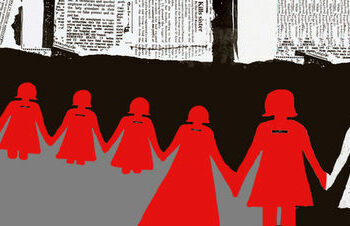

The body of the 19-year-old, in full military uniform, is covered by a golden sheet. The young man’s family carries his casket but, instead of saying their final goodbyes, take to the streets. Their thoughts are frozen like the bitter February air, their anger uncontrollable. From their native village of Haytagh in the marz of Armavir, they are walking the 24 kilometers to Yerevan to demand justice.
At 1:15 p.m. on January 30, conscript Vahram Avagyan died from a gunshot wound at a military base in Artsakh. What enraged the family was the pronouncement of the death as a suicide. They believe Vahram was murdered.
“My son could not have killed himself, he would not have done this to himself,” his father laments, his voice barely audible, powerless. He had sent off three sons to the army, they paid their duty to their homeland with honor and returned home. The father is sure that his fourth son would not have left his parents to mourn an irreplaceable loss; he would not have thrown away the life that God had blessed him with.
Authorities act swiftly in such cases. This time was no exception. They announced it a suicide, a most painful verdict for the Avagyans, especially given their deep Christian faith. But it closes the case quickly. It means the only guilty party is dead; no follow up is necessary.
Carrying the soldier’s body in their hands, the mourners are approached by Armenia’s Minister of Defense, Davit Tonoyan. The protesting mourners will not compromise. One of the women yells, “We will not back down! We will not allow another casualty!”
Their protest has not been in vain. Their pleas have finally registered. After taking to the streets, after threatening to take their child’s body to the capital, they have finally gotten the Investigative Committee to act. Three soldiers who served alongside Avagyan are arrested: Davit Movsisyan, Khachik Gasparyan and Spartak Avetisyan. Movsisyan is the son of former Republican Party MP Arakel Movsisyan, known by his nickname Shmays. All three men are charged with Article 359.3 of the Criminal Code. [Breach of relations, prescribed by field manuals, between not subordinated servicemen by using weapons or other items used for inflicting bodily injuries.]
With the announcement, the family and the mourners turn back. They bury Vahram’s body with the hope that those who stole his life are punished in accordance with the law.
And what if people had not taken to the streets?
Ten years before this incident, on March 15, 2010, 19-year-old Valeri Muradyan, who had only served for three months, was found dead in suspicious circumstances on the same military base.
The boy’s body was discovered in the courtyard, hanging from a pole, his knees touching the ground. Despite the circumstances, investigators concluded that he had taken his own life. The official explanation for his suicide was determined to be a 3000 AMD debt ($6.25).
Valeri’s mother vividly remembers the last time she spoke with her son. “My son was planning on staying in the military,” she says. “However, four days before the incident, he called home and said that he had witnessed fuel being stolen. He said that they had offered him 3000 AMD, but he wouldn’t take it. I told him, ‘Valer jan, stay away from those people.’ Four days later they killed my son. There were traces of two ropes on his neck, many fingerprints on his hands, which were clearly visible. It’s all confirmed by the forensic examination.” She believes her son was killed because he was an eye-witness to corruption, to stealing from the military.
It was four months after Valeri’s death that his parents came to the realization that there were too many suspicious circumstances surrounding the determination of suicide. Although they buried their son, for ten years now, along with other parents whose sons allegedly committed suicide while performing their mandatory two years of military service, they have been raising the issue of their sons’ deaths on different platforms, demanding a fair trial. “How is it possible that they all go to the army and commit suicide? What are they doing to these boys for them to commit suicide? They don’t realize that this is an even bigger disgrace for the army,” says Valeri’s mother. “I am convinced that these cases are all murders, concealed as suicides. I take to the streets to demand justice, I take to the streets so that other mothers will never feel my pain. These cases must be brought to light so that the officers of the military bases are held responsible. Even if soldiers take such a step, then it means that the officers have allowed an atmosphere of impunity.”
On January 10, 2020, Gor Abrahamyan, Adviser to Armenia’s Prosecutor General, announced that deaths of soldiers in the armed forces of Armenia and Artsakh had decreased by 22 percent in 2019. According to Abrahamyan, there were 49 serviceman deaths, 10 of which were cases of suicide or incitement to suicide.
In comparison, Abrahamyan noted that there were 63 deaths in 2018, 11 of them deemed suicide or incitement to suicide.
In January 2020 alone, there have already been four registered deaths of soldiers: three suspected suicides and one death resulting from an accident.
Zhanna Aleksanyan, director of Journalists for Human Rights, also believes that officers are responsible for each death in the army. “There has not been a case yet in Armenia when the commander of the base has had to answer for the death of a soldier on his base. The reason for the death of soldiers is impunity at the top of the hierarchy,” Aleksanyan says. “It’s painful that no one in the leadership understands their responsibility for those deaths. Cases continue to repeat themselves because no one thinks that that soldier can be his son. For years, we have seen how other soldiers have had to take responsibility in the courtroom, never someone from the military command. The soldiers are left with a target on their back – they are the ones being killed, and they are also the ones taking the blame for the deaths.”
Boys holding flowers lead Vahram’s funeral procession. They seem to be carrying the whole burden of the ceremony on their shoulders. These boys will themselves one day be conscripted. If their safety can be assured, if the silence is broken, the 19-year-old covered by a gold cloth being surrendered to the soil of the motherland he stood in defense of may be able to rest in peace.
by the same author
Domestic Violence: An Imperfect Law and Enduring Stereotypes
Another case of a woman being killed by her husband has forced Armenian society to speak once again about the one thing it doesn’t like to address - domestic violence.
Read more

